This class is a primary field. More...
#include <MM_Attribute.h>
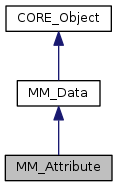
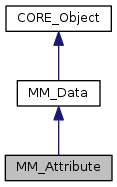
Public Member Functions | |
| tString | getCardinalityToString () const |
| get Cardinality More... | |
| void | setCardinality (const tString &card) |
| get Cardinality More... | |
| tBoolean | isSingleCardinality () const |
| verify if single cardinality More... | |
| tBoolean | isMultipleCardinality () const |
| verify if single cardinality More... | |
| void | setIsSingleCardinality () |
| set simple cardinality More... | |
| void | setIsMultipleCardinality () |
| set simple cardinality More... | |
| tBoolean | isVector () const |
| isVector More... | |
| tBoolean | isMatrix () const |
| isVector More... | |
| tBoolean | isLongDouble () const |
| verify if the field is a long double More... | |
| tBoolean | isDouble () const |
| verify if the field is a double More... | |
| tBoolean | isFloat () const |
| verify if the field is a double More... | |
| tBoolean | isLongInt (tBoolean &isUnsigned) const |
| verify if the field is a long int More... | |
| tBoolean | isLongLongInt (tBoolean &isUnsigned) const |
| verify if the field is a long long int More... | |
| tBoolean | isInt (tBoolean &isUnsigned) const |
| verify if the field is an int More... | |
| tBoolean | isShortInt (tBoolean &isUnsigned) const |
| verify if the field is an int More... | |
| tBoolean | isChar (tBoolean &isUnsigned) const |
| verify if the field is an short More... | |
| tBoolean | isBoolean () const |
| verify if the field is an short More... | |
| tBoolean | isString () const |
| verify if the field is a string More... | |
| tString | getFieldType (const int &i) const |
| get type More... | |
| virtual tString | getFieldType () const |
| get type More... | |
| void | setValue (const tString &type, const tString &card, const tString &value, const tString &separator, const tString &start, const tString &end) |
| set generic value More... | |
| void | setValue (const tString &v) |
| set the value More... | |
| void | setValue (const tBoolean &v) |
| set the value More... | |
| void | setValue (const char *v) |
| set the value More... | |
| void | setValue (const char &v) |
| set the value More... | |
| void | setValue (const short &v) |
| set the value More... | |
| void | setValue (const int &v) |
| set the value More... | |
| void | setValue (const long int &v) |
| set the value More... | |
| void | setValue (const long long int &v) |
| set the value More... | |
| void | setValue (const unsigned long long int &v) |
| set the value More... | |
| void | setValue (const unsigned char &v) |
| set the value More... | |
| void | setValue (const unsigned short &v) |
| set the value More... | |
| void | setValue (const unsigned int &v) |
| set the value More... | |
| void | setValue (const unsigned long int &v) |
| set the value More... | |
| void | setValue (const double &v) |
| set the value More... | |
| void | setValue (const long double &v) |
| set the value More... | |
| void | setValue (const vector< tString > &value) |
| set the value More... | |
| void | setValue (const vector< bool > &value) |
| set the value More... | |
| void | setValue (const vector< unsigned char > &value) |
| set the value More... | |
| void | setValue (const vector< int > &value) |
| set the value More... | |
| void | setValue (const vector< double > &value) |
| set the value More... | |
| void | setValue (const vector< long double > &value) |
| set the value More... | |
| void | setValue (const int &n, const tString *&v, const tBoolean &isCopied) |
| set the value More... | |
| void | setValue (const int &n, const bool *&v, const tBoolean &isCopied) |
| set the value More... | |
| void | setValue (const int &n, const unsigned int *&v, const tBoolean &isCopied) |
| set the value More... | |
| void | setValue (const int &n, unsigned int *v, const tBoolean &isCopied) |
| set the value More... | |
| void | setValue (const int &n, const unsigned char *&v, const tBoolean &isCopied) |
| set the value More... | |
| void | setValue (const int &n, unsigned char *v, const tBoolean &isCopied) |
| set the value More... | |
| void | setValue (const int &n, const long int *&v, const tBoolean &isCopied) |
| set the value More... | |
| void | setValue (const int &n, long int *v, const tBoolean &isCopied) |
| set the value More... | |
| void | setValue (const int &n, const long long int *&v, const tBoolean &isCopied) |
| set the value More... | |
| void | setValue (const int &n, long long int *v, const tBoolean &isCopied) |
| set the value More... | |
| void | setValue (const int &n, const int *&v, const tBoolean &isCopied) |
| set the value More... | |
| void | setValue (const int &n, const double *&v, const tBoolean &isCopied) |
| set the value More... | |
| void | setValue (const int &n, const long double *&v, const tBoolean &isCopied) |
| set the value More... | |
| void | setValue (const int &nRows, const int &nCols, const int &nValues, double *v, const tBoolean &isCopied) |
| void | setValue (const int &nRows, const int &nCols, const int &nValues, const double *&v, const tBoolean &isCopied) |
| set the value of a matrix More... | |
| void | setValue (const int &nRows, const int &nCols, const vector< double > &v) |
| set the value of a matrix More... | |
| double * | createValue (const int &nRows, const int &nCols, const int &nValues) |
| set the value of a matrix More... | |
| double * | createDoubleValue (const int &nValues) |
| set the value of a matrix More... | |
| int * | createIntValue (const int &nValues) |
| set the value of a matrix More... | |
| tString | getValueToString (const tString &separator, const tString &start, const tString &end) const |
| get the value in string More... | |
| tBoolean | getValue (tString &v) const |
| get the value More... | |
| tBoolean | getValue (tBoolean &v) const |
| get the value More... | |
| tBoolean | getValue (char &v) const |
| get the value More... | |
| tBoolean | getValue (short &v) const |
| get the value More... | |
| tBoolean | getValue (int &v) const |
| get the value More... | |
| tBoolean | getValue (long int &v) const |
| get the value More... | |
| tBoolean | getValue (long long int &v) const |
| get the value More... | |
| tBoolean | getValue (unsigned long long int &v) const |
| get the value More... | |
| tBoolean | getValue (unsigned char &v) const |
| get the value More... | |
| tBoolean | getValue (unsigned short &v) const |
| get the value More... | |
| tBoolean | getValue (unsigned int &v) const |
| get the value More... | |
| tBoolean | getValue (unsigned long int &v) const |
| get the value size_t = unsigned long int More... | |
| tBoolean | getValue (float &v) const |
| get the value More... | |
| tBoolean | getValue (double &v) const |
| get the value More... | |
| tBoolean | getValue (long double &v) const |
| get the value More... | |
| tBoolean | getValue (vector< tString > &v) const |
| get the value string array More... | |
| tBoolean | getValue (int &n, const tString *&v) const |
| get the value string array by reference More... | |
| tBoolean | getValue (int &n, const bool *&v) const |
| get the value vector of boolean by reference More... | |
| tBoolean | getValue (int &n, bool *&v) const |
| get the value vector of boolean by coppiing More... | |
| tBoolean | getValue (int &n, tString *&v) const |
| get the value string array by copiing More... | |
| tBoolean | getValue (int &n, const unsigned char *&v) const |
| get the value vector of int by reference More... | |
| tBoolean | getValue (int &n, unsigned char *&v) const |
| get the value vector of int by coppiing More... | |
| tBoolean | getValue (int &n, const char *&v) const |
| get the value vector of int by reference More... | |
| tBoolean | getValue (int &n, char *&v) const |
| get the value vector of int by coppiing More... | |
| tBoolean | getValue (int &n, const unsigned short *&v) const |
| get the value vector of unsigned short by reference More... | |
| tBoolean | getValue (int &n, unsigned short *&v) const |
| get the value vector of short by coppiing More... | |
| tBoolean | getValue (int &n, const short *&v) const |
| get the value vector of short by reference More... | |
| tBoolean | getValue (int &n, short *&v) const |
| get the value vector of short by coppiing More... | |
| tBoolean | getValue (int &n, const unsigned int *&v) const |
| get the value vector of unsigned int by reference More... | |
| tBoolean | getValue (int &n, unsigned int *&v) const |
| get the value vector of unsigned int by coppiing More... | |
| tBoolean | getValue (int &n, const int *&v) const |
| get the value vector of int by reference More... | |
| tBoolean | getValue (int &n, int *&v) const |
| get the value vector of int by coppiing the array must be destroyed More... | |
| tBoolean | getValue (int &n, const unsigned long int *&v) const |
| get the value vector of unisgned long int by reference More... | |
| tBoolean | getValue (int &n, unsigned long int *&v) const |
| get the value vector of long int by copping More... | |
| tBoolean | getValue (int &n, const long int *&v) const |
| get the value vector of long int by reference More... | |
| tBoolean | getValue (int &n, long int *&v) const |
| get the value vector of long int by copping More... | |
| tBoolean | getValue (int &n, const long long int *&v) const |
| get the value vector of long int by reference More... | |
| tBoolean | getValue (int &n, long long int *&v) const |
| get the value vector of long int by copping More... | |
| tBoolean | getValue (int &n, const unsigned long long int *&v) const |
| get the value vector of long int by reference More... | |
| tBoolean | getValue (int &n, unsigned long long int *&v) const |
| get the value vector of long int by copping More... | |
| tBoolean | getValue (int &n, const float *&v) const |
| get the value vector of float by reference More... | |
| tBoolean | getValue (int &n, float *&v) const |
| get the value vector of float by coppiing More... | |
| tBoolean | getValue (int &n, const double *&v) const |
| get the value vector of double by reference More... | |
| tBoolean | getValue (int &n, double *&v) const |
| get the value vector of double by coppiing More... | |
| tBoolean | getValue (int &n, const long double *&v) const |
| get the value vector of long double by reference More... | |
| tBoolean | getValue (int &n, long double *&v) const |
| get the value vector of double by coppiing More... | |
| int | getDimension (const tFlag &d) const |
| get the dimension of row , col or size @ see DIM More... | |
| tBoolean | getValue (int &nRows, int &nCols, int &n, const double *&v) const |
| get the value matrix double by reference More... | |
| tBoolean | getValue (int &nRows, int &nCols, int &n, double *&v) const |
| virtual tString | toString () const |
| turn the class into string More... | |
| void | getSharedPointer (SP::CORE_Object &p) |
| get the shared pointer of this class into p More... | |
| void | getSharedPointer (SPC::CORE_Object &p) const |
| get the shared pointer of this class into p More... | |
| tString | getClassName () const |
| return the class name of the object More... | |
| tString | getIdentityString () const |
| return the identity string of the object of the form className_at_address More... | |
| tString | getPointerAddress () const |
| return the identity string of the object More... | |
| template<class T > | |
| tBoolean | isInstanceOf () const |
| return true if the object is an instance of T More... | |
| virtual void | print () |
| print the class More... | |
| virtual ostream & | print (ostream &out) const |
| print the class More... | |
| virtual void | print (const tString &message) |
| print the class More... | |
| virtual void | print (const tInteger &str) |
| print More... | |
| virtual void | print (const tRelativeInteger &str) |
| print More... | |
| virtual void | print (const tReal &str) |
| print More... | |
| virtual void | print (const int &str) |
| print More... | |
Static Public Member Functions | |
| static SP::MM_Attribute | New () |
| creta a matlab class More... | |
| static tString | getClassName (const tString &identityString) |
| return the class name of the object using only the identity string More... | |
| template<class T > | |
| static tString | getTypeName () |
| get type name More... | |
| static tBoolean | is64Architecture () |
| return true if the machine is a 64 bits machine More... | |
| static tBoolean | is32Architecture () |
| return true if the machine is a 32 bits machine More... | |
| static tString | pointer2String (const void *obj) |
| return the string represantation of a pointer More... | |
| static void | setOutput (ostream &out) |
| set output More... | |
| static ostream & | getOutput () |
| get output More... | |
| static void | printObjectsInMemory () |
| print object in memory More... | |
| static ostream & | print (ostream &out, const tString &message) |
| print the class More... | |
| static void | outputPrint (const tString &message) |
Static Public Attributes | |
| static const tFlag | DIM =0 |
| static const tFlag | ROW =1 |
| static const tFlag | COL =2 |
| static tBoolean | mIsMemoryTesting =false |
| indicator to store all classes created and deleted only for debuging version More... | |
Protected Member Functions | |
| MM_Attribute (void) | |
| create an object More... | |
| virtual | ~MM_Attribute (void) |
| destroy an object. More... | |
| void | setThis (SP::CORE_Object p) |
| set this weak shared pointer called toDoAfterThis setting method More... | |
| virtual void | setType (tString type) |
| set the type of the object More... | |
| virtual void | toDoAfterThisSetting () |
| method called after setThis() method this method can oly be called once. More... | |
Detailed Description
This class is a primary field.
- Version
- 1.0
Constructor & Destructor Documentation
|
protected |
create an object
References null, and CORE_Object::setType().
Referenced by New().

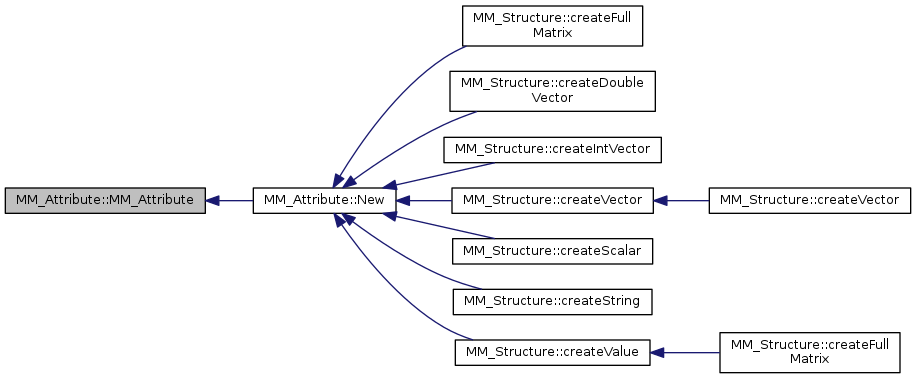
|
protectedvirtual |
destroy an object.
References isSingleCardinality(), and null.

Member Function Documentation
|
inline |
set the value of a matrix
References DIM, and setIsSingleCardinality().

|
inline |
set the value of a matrix
References DIM, and setIsSingleCardinality().

|
inline |
set the value of a matrix
References COL, DIM, ROW, and setIsSingleCardinality().

|
inline |
get Cardinality
return the class name of the object using only the identity string
Referenced by UI_Class::createVector2D(), LAP_DoublePackedUpperMatrix::matrixProduct(), LAP_DoubleBandedUpperMatrix::matrixProduct(), LAP_DoubleFullUpperMatrix::matrixProduct(), and CORE_Object::printObjectsInMemory().
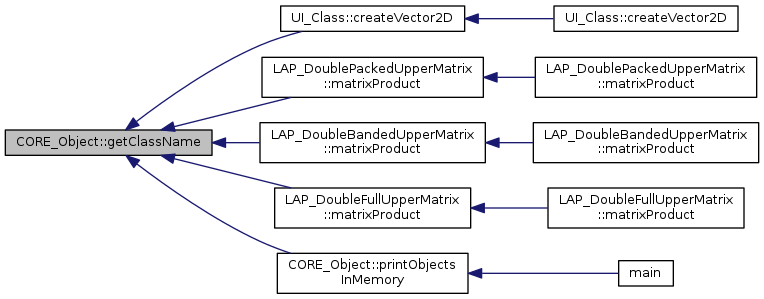
|
inherited |
return the class name of the object
- Returns
- the class name of the object
References tString.
Referenced by CORE_Object::getIdentityString().

|
inline |
| tString MM_Attribute::getFieldType | ( | const int & | i | ) | const |
get type
|
inlinevirtual |
get type
|
inlineinherited |
return the identity string of the object of the form className_at_address
- Returns
- the identity string of the object
References CORE_Object::getClassName(), CORE_Object::pointer2String(), and tString.
Referenced by UI_Class::createPrimitiveMap(), UI_Class::saveAssociation(), UI_Class::saveClass(), UI_ClassFactory::saveIntoClass(), MATH_StiefelFunction::toString(), LAP_2DView::toString(), CORE_Object::toString(), MATH_StiefelOptimizer::toString(), and MM_Class::toString().

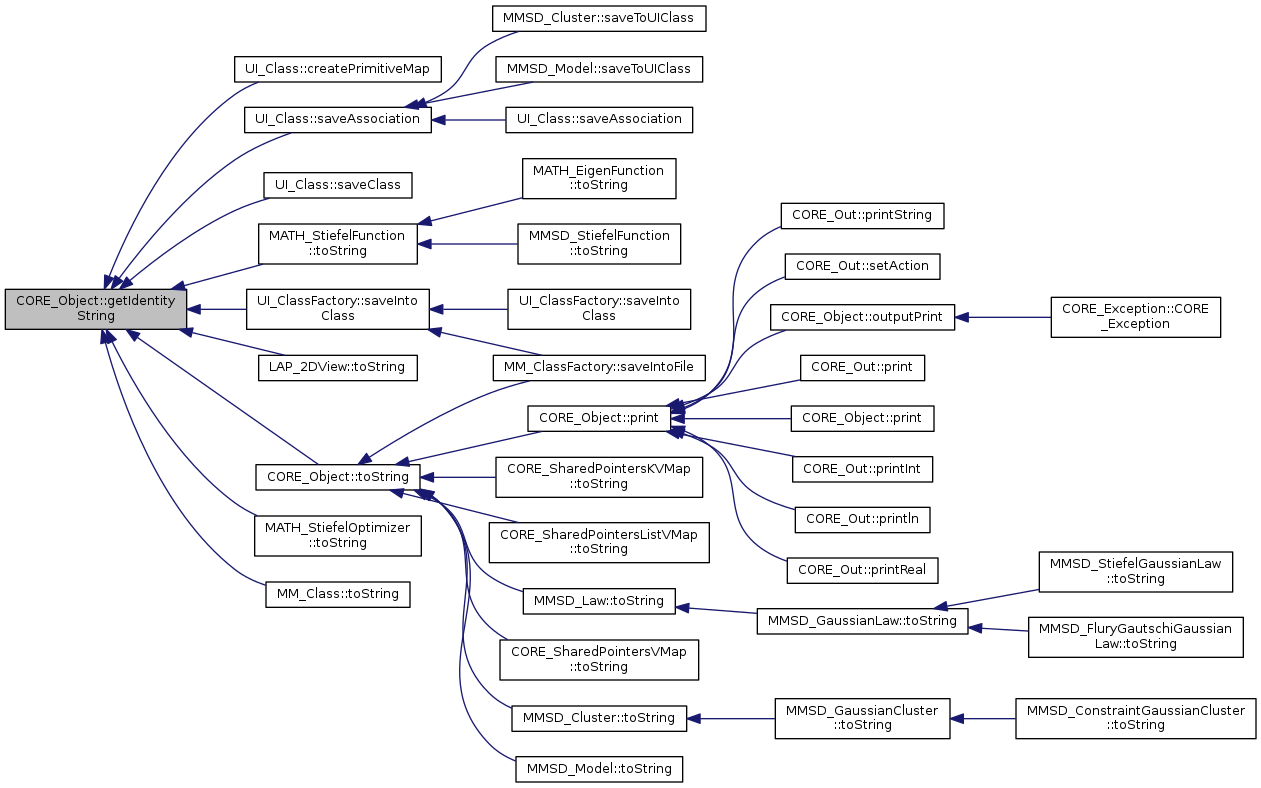
|
inlinestaticinherited |
get output
|
inlineinherited |
return the identity string of the object
- Returns
- the identity string of the object
References CORE_Object::pointer2String().

|
inlineinherited |
get the shared pointer of this class into p
Referenced by CORE_Map< Key, Value >::getSharedPointer(), CORE_Array< tFlag >::getSharedPointer(), LAP_ConstVector< lapack_real >::getSharedPointer(), STAT_Combinatorial< T >::getSharedPointer(), LAP_Vector< lapack_int >::getSharedPointer(), CORE_Vector< T >::getSharedPointer(), CORE_Matrix< T >::getSharedPointer(), and CORE_Object::printObjectsInMemory().

|
inlineinherited |
get the shared pointer of this class into p
|
inlinestaticinherited |
get type name
References tString.
get the value
References isString(), null, and tString.
Referenced by MM_Structure::getFullMatrix(), MM_Structure::getScalar(), MM_Structure::getString(), getValueToString(), and MM_Structure::getVector().

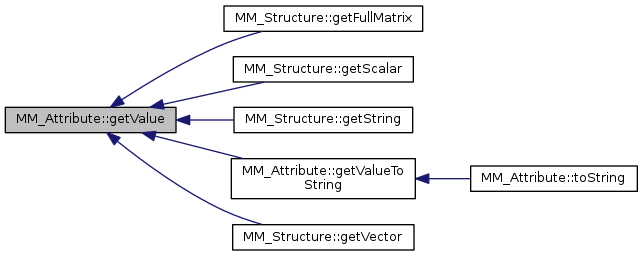
|
inline |
get the value
References null.
|
inline |
get the value size_t = unsigned long int
References null.
get the value string array by reference
References DIM, isString(), null, and tString.

|
inline |
get the value vector of boolean by reference
References DIM, isBoolean(), and null.

|
inline |
|
inline |
|
inline |
|
inline |
|
inline |
|
inline |
get the value vector of unsigned short by reference
References DIM, isShortInt(), null, and tBoolean.

|
inline |
|
inline |
get the value vector of short by reference
References DIM, isShortInt(), null, and tBoolean.

|
inline |
|
inline |
|
inline |
|
inline |
|
inline |
|
inline |
get the value vector of unisgned long int by reference
References DIM, isLongInt(), null, and tBoolean.

|
inline |
|
inline |
get the value vector of long int by reference
References DIM, isLongInt(), null, and tBoolean.

|
inline |
|
inline |
get the value vector of long int by reference
References DIM, isLongLongInt(), null, and tBoolean.

|
inline |
|
inline |
get the value vector of long int by reference
References DIM, isLongLongInt(), null, and tBoolean.

|
inline |
|
inline |
|
inline |
|
inline |
get the value vector of double by reference
References DIM, isDouble(), and null.

|
inline |
|
inline |
get the value vector of long double by reference
References DIM, isLongDouble(), and null.

|
inline |
|
inline |
get the value matrix double by reference
References COL, DIM, isDouble(), null, and ROW.

|
inline |
| tString MM_Attribute::getValueToString | ( | const tString & | separator, |
| const tString & | start, | ||
| const tString & | end | ||
| ) | const |
get the value in string
References getValue(), isSingleCardinality(), null, tBoolean, CORE_Real::toString(), CORE_String::toString(), and tString.
Referenced by toString().


|
inlinestaticinherited |
return true if the machine is a 32 bits machine
References CORE_Object::is64Architecture().

|
staticinherited |
return true if the machine is a 64 bits machine
Referenced by CORE_Object::is32Architecture().

|
inline |
verify if the field is an short
Referenced by getValue(), and MM_Structure::isBoolean().

verify if the field is an short
Referenced by getValue(), and MM_Structure::isChar().

|
inline |
verify if the field is a double
Referenced by getValue(), MM_Structure::isDouble(), and MM_Structure::isDoubleFullMatrix().

|
inline |
verify if the field is a double
Referenced by getValue(), and MM_Structure::isFloat().

|
inlineinherited |
return true if the object is an instance of T
References null.
verify if the field is an int
Referenced by getValue(), and MM_Structure::isInt().

|
inline |
verify if the field is a long double
Referenced by getValue(), and MM_Structure::isLongDouble().

verify if the field is a long int
Referenced by getValue(), and MM_Structure::isLongInt().

verify if the field is a long long int
Referenced by getValue(), and MM_Structure::isLongLongInt().

|
inline |
isVector
Referenced by MM_Structure::isDoubleFullMatrix().

|
inline |
verify if single cardinality
Referenced by isVector(), and setValue().
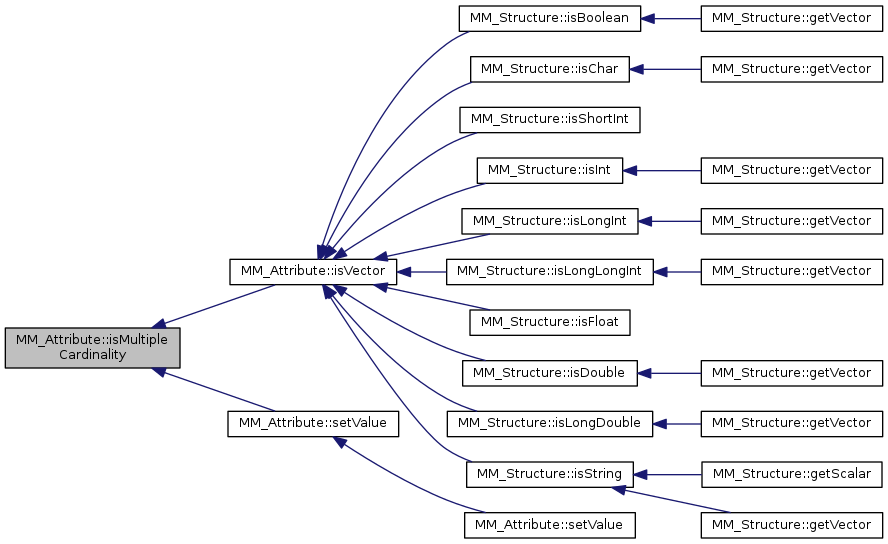
verify if the field is an int
Referenced by getValue(), and MM_Structure::isShortInt().

|
inline |
verify if single cardinality
Referenced by getValueToString(), and ~MM_Attribute().

|
inline |
verify if the field is a string
Referenced by getValue(), and MM_Structure::isString().
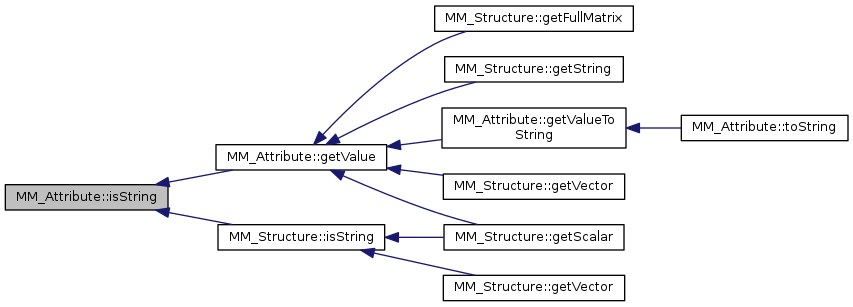
|
inline |
isVector
References isMultipleCardinality().
Referenced by MM_Structure::isBoolean(), MM_Structure::isChar(), MM_Structure::isDouble(), MM_Structure::isFloat(), MM_Structure::isInt(), MM_Structure::isLongDouble(), MM_Structure::isLongInt(), MM_Structure::isLongLongInt(), MM_Structure::isShortInt(), and MM_Structure::isString().

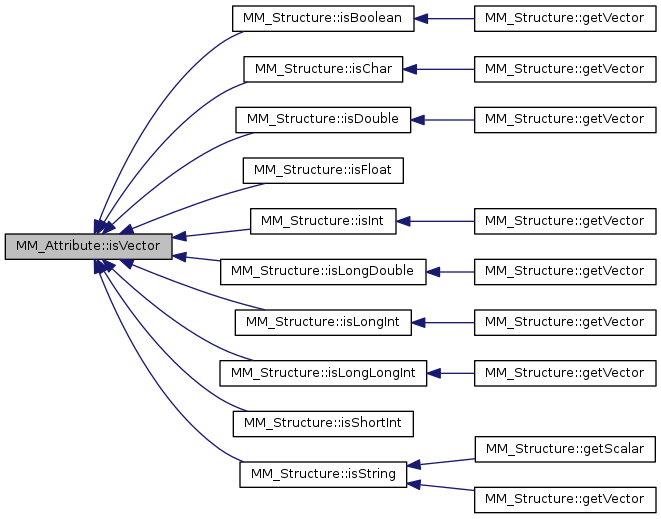
|
inlinestatic |
creta a matlab class
References MM_Attribute().
Referenced by MM_Structure::createDoubleVector(), MM_Structure::createFullMatrix(), MM_Structure::createIntVector(), MM_Structure::createScalar(), MM_Structure::createString(), MM_Structure::createValue(), and MM_Structure::createVector().

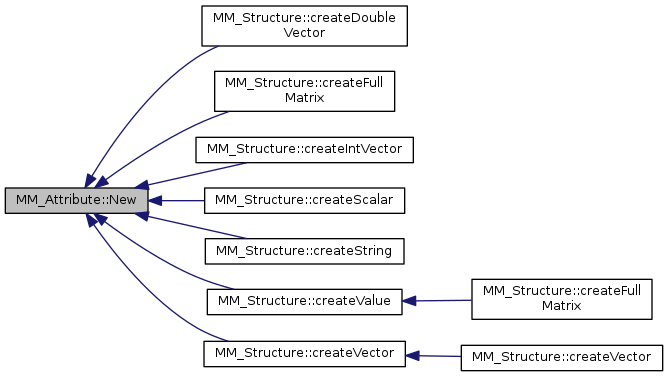
|
staticinherited |
print on output
References null, and CORE_Object::print().
Referenced by CORE_Exception::CORE_Exception().


|
staticinherited |
return the string represantation of a pointer
References tString.
Referenced by CORE_Object::CORE_Object(), CORE_Object::getIdentityString(), CORE_Object::getPointerAddress(), and CORE_Object::~CORE_Object().
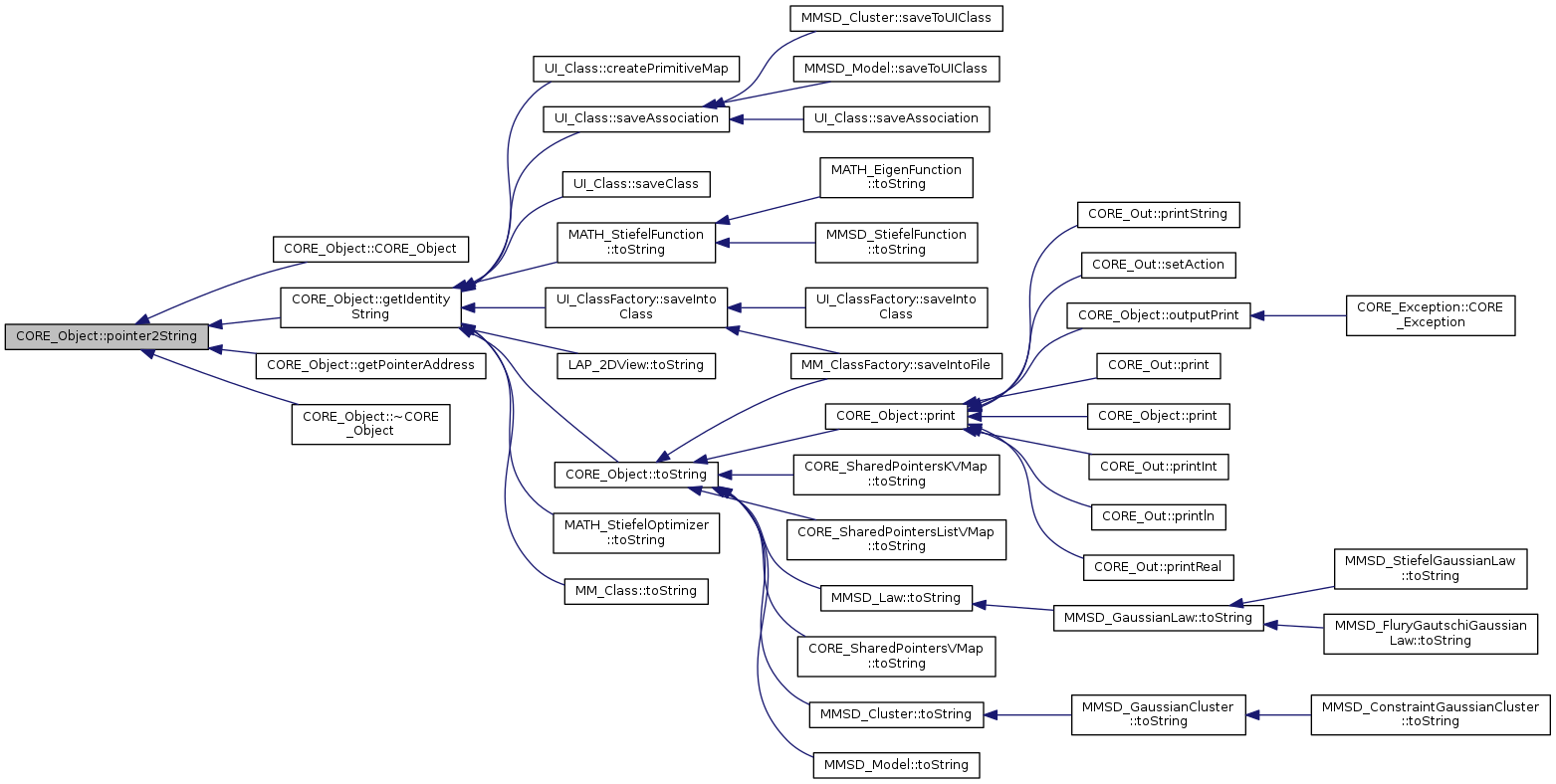
|
inlinevirtualinherited |
print the class
References CORE_Object::toString().
Referenced by CORE_Object::outputPrint(), CORE_Out::print(), CORE_Object::print(), CORE_Out::printInt(), CORE_Out::println(), CORE_Out::printReal(), CORE_Out::printString(), and CORE_Out::setAction().

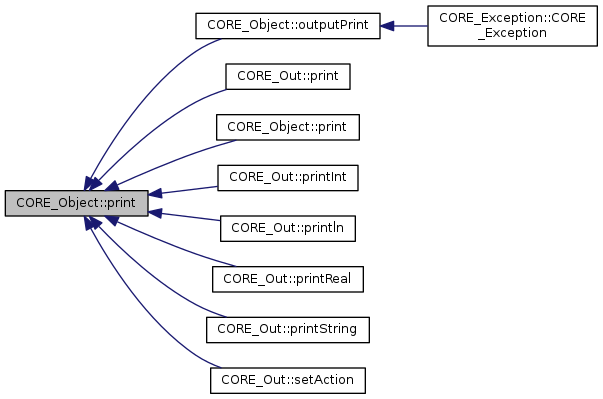
|
inlinevirtualinherited |
print the class
References CORE_Object::print(), and CORE_Object::toString().

|
virtualinherited |
print the class
Reimplemented in CORE_Out.
References null, and CORE_Object::print().

|
virtualinherited |
References null.
|
virtualinherited |
References null.
|
inlinestaticinherited |
print the class
|
staticinherited |
print object in memory
References CORE_Object::getClassName(), CORE_Object::getSharedPointer(), and CORE_Object::mIsMemoryTesting.
Referenced by main().


|
inline |
get Cardinality
References setIsMultipleCardinality(), and setIsSingleCardinality().
Referenced by setValue().


|
inline |
set simple cardinality
Referenced by setCardinality(), and setValue().

|
inline |
set simple cardinality
Referenced by createDoubleValue(), createIntValue(), createValue(), setCardinality(), and setValue().

|
inlinestaticinherited |
set output
|
inlineprotectedinherited |
set this weak shared pointer called toDoAfterThis setting method
References CORE_Object::toDoAfterThisSetting().

|
inlineprotectedvirtualinherited |
set the type of the object
Referenced by LAP_IntegerVector::LAP_IntegerVector(), MATH_BetaFunction::MATH_BetaFunction(), MATH_C1Function::MATH_C1Function(), MATH_DigammaFunction::MATH_DigammaFunction(), MATH_EigenFunction::MATH_EigenFunction(), MATH_Equation::MATH_Equation(), MATH_Function::MATH_Function(), MATH_GammaFunction::MATH_GammaFunction(), MATH_KeplerFunction::MATH_KeplerFunction(), MATH_LogGammaFunction::MATH_LogGammaFunction(), MATH_NewtonEquation::MATH_NewtonEquation(), MATH_StiefelFunction::MATH_StiefelFunction(), MATH_StiefelOptimizer::MATH_StiefelOptimizer(), MATH_TranscendentEquation::MATH_TranscendentEquation(), MATH_TrigammaFunction::MATH_TrigammaFunction(), MATH_ZeroEquation::MATH_ZeroEquation(), MATH_ZKeplerFunction::MATH_ZKeplerFunction(), MM_Attribute(), MM_Class::MM_Class(), MM_ClassFactory::MM_ClassFactory(), MM_Data::MM_Data(), MM_Structure::MM_Structure(), MMSD_ClassFactory::MMSD_ClassFactory(), MMSD_Cluster::MMSD_Cluster(), MMSD_ConstDoubleVector::MMSD_ConstDoubleVector(), MMSD_ConstraintGaussianCluster::MMSD_ConstraintGaussianCluster(), MMSD_ConstraintGaussianModel::MMSD_ConstraintGaussianModel(), MMSD_DataSet::MMSD_DataSet(), MMSD_DataSetClassFactory::MMSD_DataSetClassFactory(), MMSD_DoubleFullMatrix::MMSD_DoubleFullMatrix(), MMSD_DoubleSymmetricMatrix::MMSD_DoubleSymmetricMatrix(), MMSD_DoubleVector::MMSD_DoubleVector(), MMSD_FluryGautschiGaussianLaw::MMSD_FluryGautschiGaussianLaw(), MMSD_GaussianCluster::MMSD_GaussianCluster(), MMSD_GaussianFDFunction::MMSD_GaussianFDFunction(), MMSD_GaussianLaw::MMSD_GaussianLaw(), MMSD_GaussianModel::MMSD_GaussianModel(), MMSD_Law::MMSD_Law(), MMSD_Model::MMSD_Model(), MMSD_ModelClassFactory::MMSD_ModelClassFactory(), MMSD_Object::MMSD_Object(), MMSD_StiefelFunction::MMSD_StiefelFunction(), MMSD_StiefelGaussianLaw::MMSD_StiefelGaussianLaw(), STAT_BernoulliDistribution::STAT_BernoulliDistribution(), STAT_BinomialDistribution::STAT_BinomialDistribution(), STAT_Combinatorial< T >::STAT_Combinatorial(), STAT_DiracDistribution::STAT_DiracDistribution(), STAT_Distribution::STAT_Distribution(), STAT_ExponentialDistribution::STAT_ExponentialDistribution(), STAT_GammaDistribution::STAT_GammaDistribution(), STAT_GeometricDistribution::STAT_GeometricDistribution(), STAT_InverseNormalDistribution::STAT_InverseNormalDistribution(), STAT_NormalDistribution::STAT_NormalDistribution(), STAT_Object::STAT_Object(), STAT_PoissonDistribution::STAT_PoissonDistribution(), STAT_UniformDistribution::STAT_UniformDistribution(), and STAT_UniformLaplaceTransform::STAT_UniformLaplaceTransform().
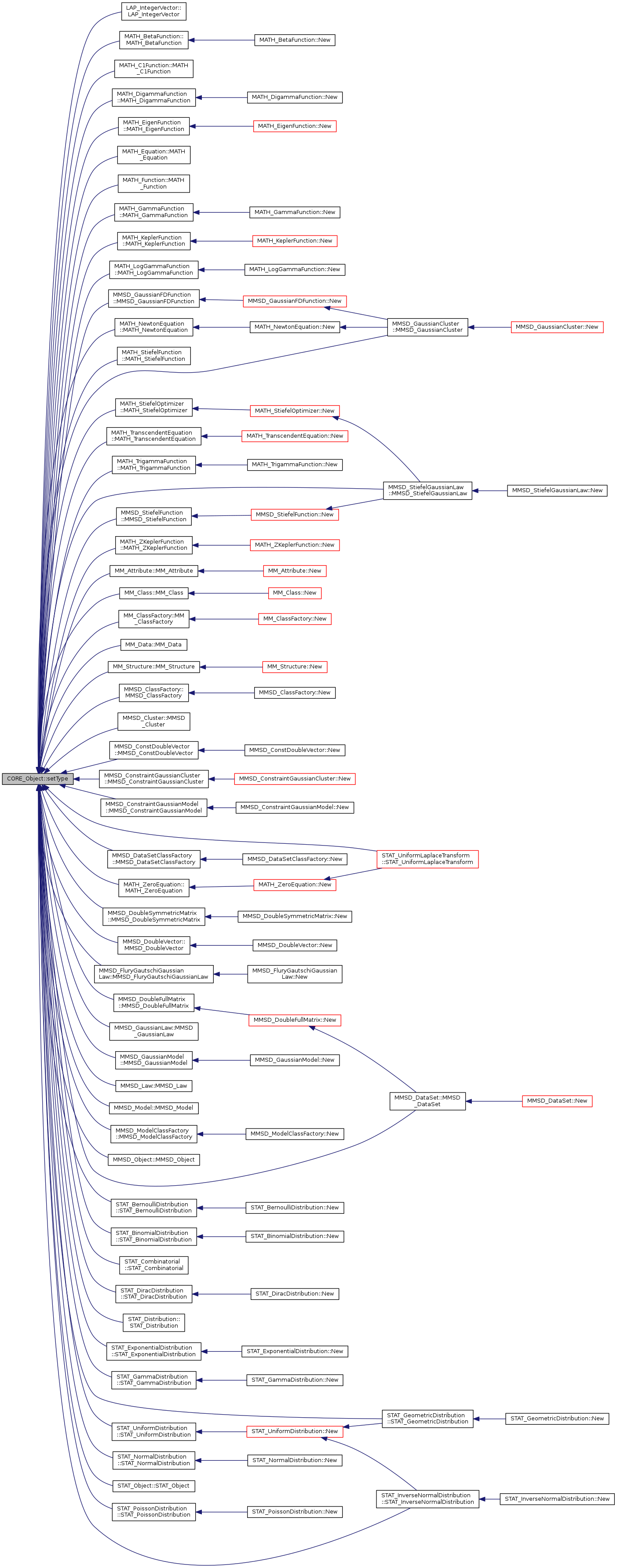
| void MM_Attribute::setValue | ( | const tString & | type, |
| const tString & | card, | ||
| const tString & | value, | ||
| const tString & | separator, | ||
| const tString & | start, | ||
| const tString & | end | ||
| ) |
set generic value
References DIM, CORE_String::indexOf(), isMultipleCardinality(), CORE_String::lastIndexOf(), CORE_String::length(), null, setCardinality(), CORE_String::substring(), CORE_String::tokenize(), CORE_String::trim(), and tString.
Referenced by setValue().
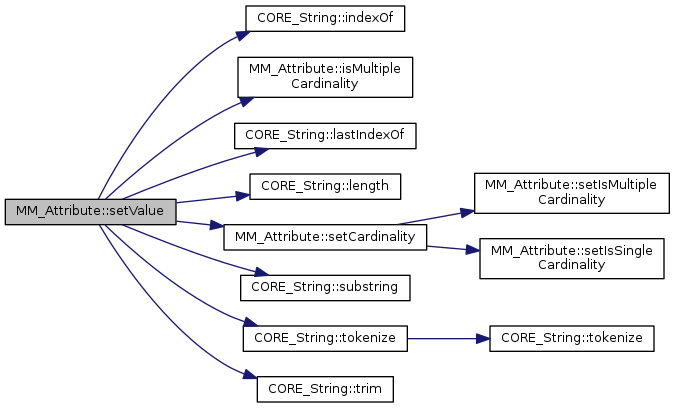

|
inline |
set the value
References DIM, setIsSingleCardinality(), and tString.

|
inline |
set the value
References DIM, setIsSingleCardinality(), and tBoolean.

|
inline |
|
inline |
set the value
References DIM, and setIsSingleCardinality().

|
inline |
set the value
References DIM, and setIsSingleCardinality().

|
inline |
set the value
References DIM, and setIsSingleCardinality().

|
inline |
set the value
References DIM, and setIsSingleCardinality().

|
inline |
set the value
References DIM, and setIsSingleCardinality().

|
inline |
set the value
References DIM, and setIsSingleCardinality().

|
inline |
set the value
References DIM, and setIsSingleCardinality().

|
inline |
set the value
References DIM, and setIsSingleCardinality().

|
inline |
set the value
References DIM, and setIsSingleCardinality().

|
inline |
set the value
References DIM, and setIsSingleCardinality().

|
inline |
set the value
References DIM, and setIsSingleCardinality().

|
inline |
set the value
References DIM, and setIsSingleCardinality().

|
inline |
set the value
References DIM, null, and setIsMultipleCardinality().

|
inline |
set the value
References DIM, null, and setIsMultipleCardinality().

|
inline |
set the value
References DIM, null, and setIsMultipleCardinality().

|
inline |
set the value
References DIM, null, and setIsMultipleCardinality().

|
inline |
set the value
References DIM, null, and setIsMultipleCardinality().

|
inline |
set the value
References DIM, null, and setIsMultipleCardinality().

set the value
References DIM, null, setIsMultipleCardinality(), and tString.

|
inline |
set the value
References DIM, null, and setIsMultipleCardinality().

|
inline |
set the value
References DIM, null, and setIsMultipleCardinality().

|
inline |
|
inline |
set the value
References DIM, null, and setIsMultipleCardinality().

|
inline |
|
inline |
set the value
References DIM, null, and setIsMultipleCardinality().

|
inline |
|
inline |
set the value
References DIM, null, and setIsMultipleCardinality().

|
inline |
|
inline |
set the value
References DIM, null, and setIsMultipleCardinality().

|
inline |
set the value
References DIM, null, and setIsMultipleCardinality().

|
inline |
set the value
References DIM, null, and setIsMultipleCardinality().

|
inline |
|
inline |
set the value of a matrix
References COL, DIM, null, ROW, and setIsSingleCardinality().

|
inline |
set the value of a matrix
References COL, DIM, ROW, and setIsSingleCardinality().

|
inlineprotectedvirtualinherited |
method called after setThis() method this method can oly be called once.
Reimplemented in STAT_UniformLaplaceTransform.
Referenced by CORE_Object::setThis(), and STAT_UniformLaplaceTransform::toDoAfterThisSetting().

|
inlinevirtual |
turn the class into string
Reimplemented from CORE_Object.
References getValueToString().

Member Data Documentation
|
static |
Referenced by createValue(), getValue(), and setValue().
|
static |
Referenced by createDoubleValue(), createIntValue(), createValue(), getValue(), and setValue().
|
staticinherited |
indicator to store all classes created and deleted only for debuging version
Referenced by CORE_Object::CORE_Object(), main(), CORE_Object::printObjectsInMemory(), and CORE_Object::~CORE_Object().
|
static |
Referenced by createValue(), getValue(), and setValue().
The documentation for this class was generated from the following files:







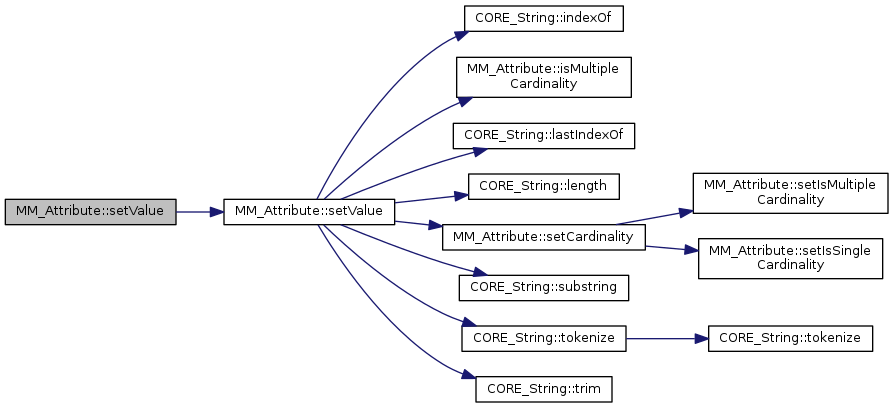
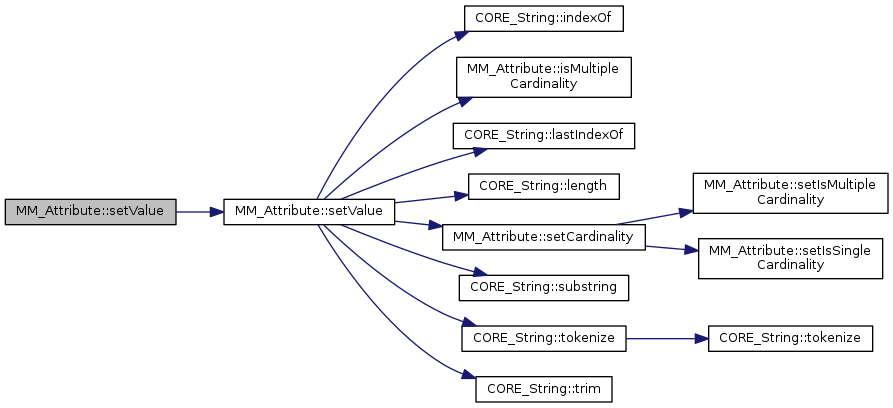
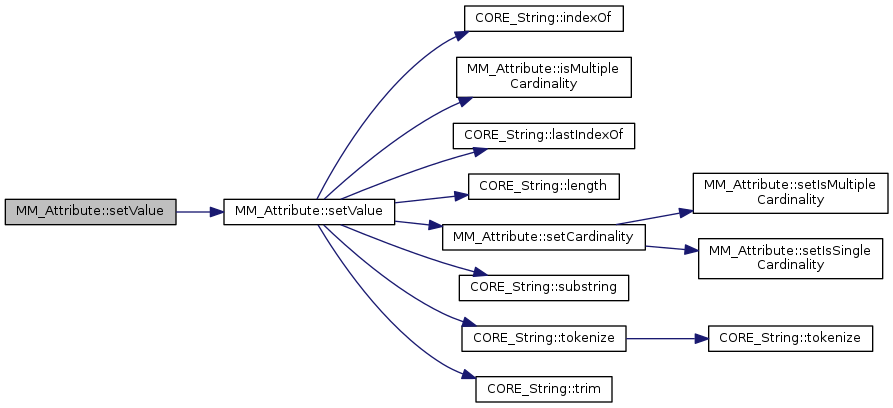
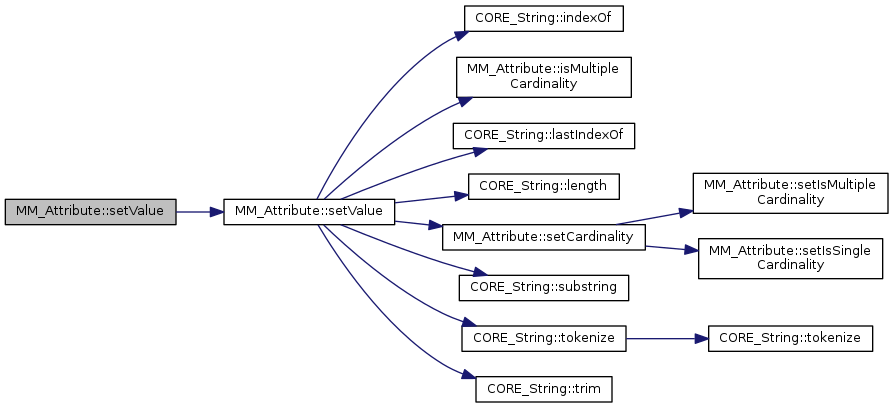
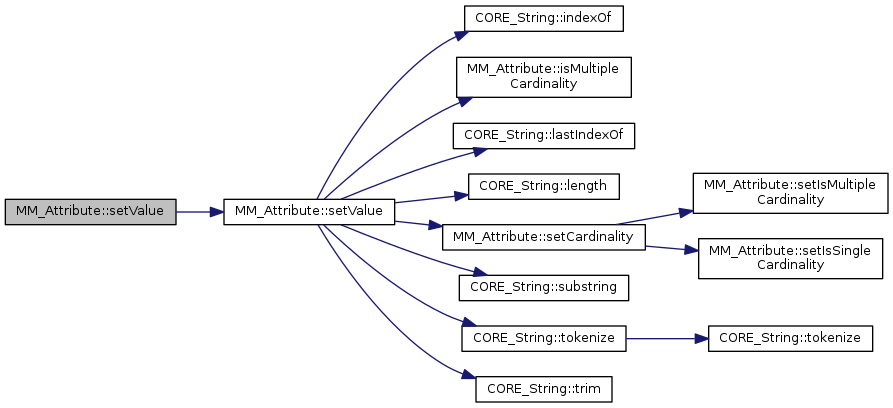
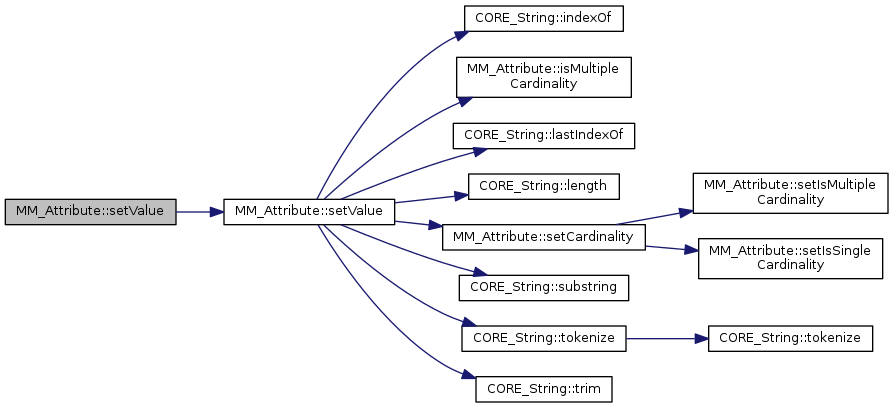
 1.8.8
1.8.8